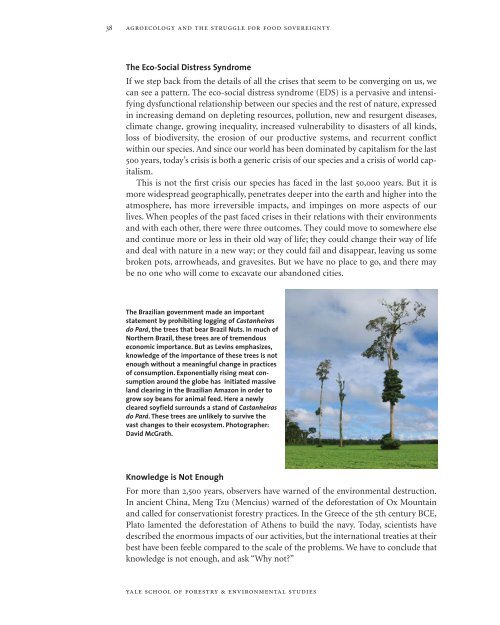Agroecology and the Struggle for Food Sovereignty ... - Yale University
Agroecology and the Struggle for Food Sovereignty ... - Yale University
Agroecology and the Struggle for Food Sovereignty ... - Yale University
Create successful ePaper yourself
Turn your PDF publications into a flip-book with our unique Google optimized e-Paper software.
38<br />
agroecology <strong>and</strong> <strong>the</strong> struggle <strong>for</strong> food sovereignty<br />
The Eco-Social Distress Syndrome<br />
If we step back from <strong>the</strong> details of all <strong>the</strong> crises that seem to be converging on us, we<br />
can see a pattern. The eco-social distress syndrome (EDS) is a pervasive <strong>and</strong> intensifying<br />
dysfunctional relationship between our species <strong>and</strong> <strong>the</strong> rest of nature, expressed<br />
in increasing dem<strong>and</strong> on depleting resources, pollution, new <strong>and</strong> resurgent diseases,<br />
climate change, growing inequality, increased vulnerability to disasters of all kinds,<br />
loss of biodiversity, <strong>the</strong> erosion of our productive systems, <strong>and</strong> recurrent conflict<br />
within our species. And since our world has been dominated by capitalism <strong>for</strong> <strong>the</strong> last<br />
500 years, today’s crisis is both a generic crisis of our species <strong>and</strong> a crisis of world capitalism.<br />
This is not <strong>the</strong> first crisis our species has faced in <strong>the</strong> last 50,000 years. But it is<br />
more widespread geographically, penetrates deeper into <strong>the</strong> earth <strong>and</strong> higher into <strong>the</strong><br />
atmosphere, has more irreversible impacts, <strong>and</strong> impinges on more aspects of our<br />
lives. When peoples of <strong>the</strong> past faced crises in <strong>the</strong>ir relations with <strong>the</strong>ir environments<br />
<strong>and</strong> with each o<strong>the</strong>r, <strong>the</strong>re were three outcomes. They could move to somewhere else<br />
<strong>and</strong> continue more or less in <strong>the</strong>ir old way of life; <strong>the</strong>y could change <strong>the</strong>ir way of life<br />
<strong>and</strong> deal with nature in a new way; or <strong>the</strong>y could fail <strong>and</strong> disappear, leaving us some<br />
broken pots, arrowheads, <strong>and</strong> gravesites. But we have no place to go, <strong>and</strong> <strong>the</strong>re may<br />
be no one who will come to excavate our ab<strong>and</strong>oned cities.<br />
The Brazilian government made an important<br />
statement by prohibiting logging of Castanheiras<br />
do Pará, <strong>the</strong> trees that bear Brazil Nuts. In much of<br />
Nor<strong>the</strong>rn Brazil, <strong>the</strong>se trees are of tremendous<br />
economic importance. But as Levins emphasizes,<br />
knowledge of <strong>the</strong> importance of <strong>the</strong>se trees is not<br />
enough without a meaningful change in practices<br />
of consumption. Exponentially rising meat consumption<br />
around <strong>the</strong> globe has initiated massive<br />
l<strong>and</strong> clearing in <strong>the</strong> Brazilian Amazon in order to<br />
grow soy beans <strong>for</strong> animal feed. Here a newly<br />
cleared soyfield surrounds a st<strong>and</strong> of Castanheiras<br />
do Pará. These trees are unlikely to survive <strong>the</strong><br />
vast changes to <strong>the</strong>ir ecosystem. Photographer:<br />
David McGrath.<br />
Knowledge is Not Enough<br />
For more than 2,500 years, observers have warned of <strong>the</strong> environmental destruction.<br />
In ancient China, Meng Tzu (Mencius) warned of <strong>the</strong> de<strong>for</strong>estation of Ox Mountain<br />
<strong>and</strong> called <strong>for</strong> conservationist <strong>for</strong>estry practices. In <strong>the</strong> Greece of <strong>the</strong> 5th century BCE,<br />
Plato lamented <strong>the</strong> de<strong>for</strong>estation of A<strong>the</strong>ns to build <strong>the</strong> navy. Today, scientists have<br />
described <strong>the</strong> enormous impacts of our activities, but <strong>the</strong> international treaties at <strong>the</strong>ir<br />
best have been feeble compared to <strong>the</strong> scale of <strong>the</strong> problems. We have to conclude that<br />
knowledge is not enough, <strong>and</strong> ask “Why not?”<br />
yale school of <strong>for</strong>estry & environmental studies

















